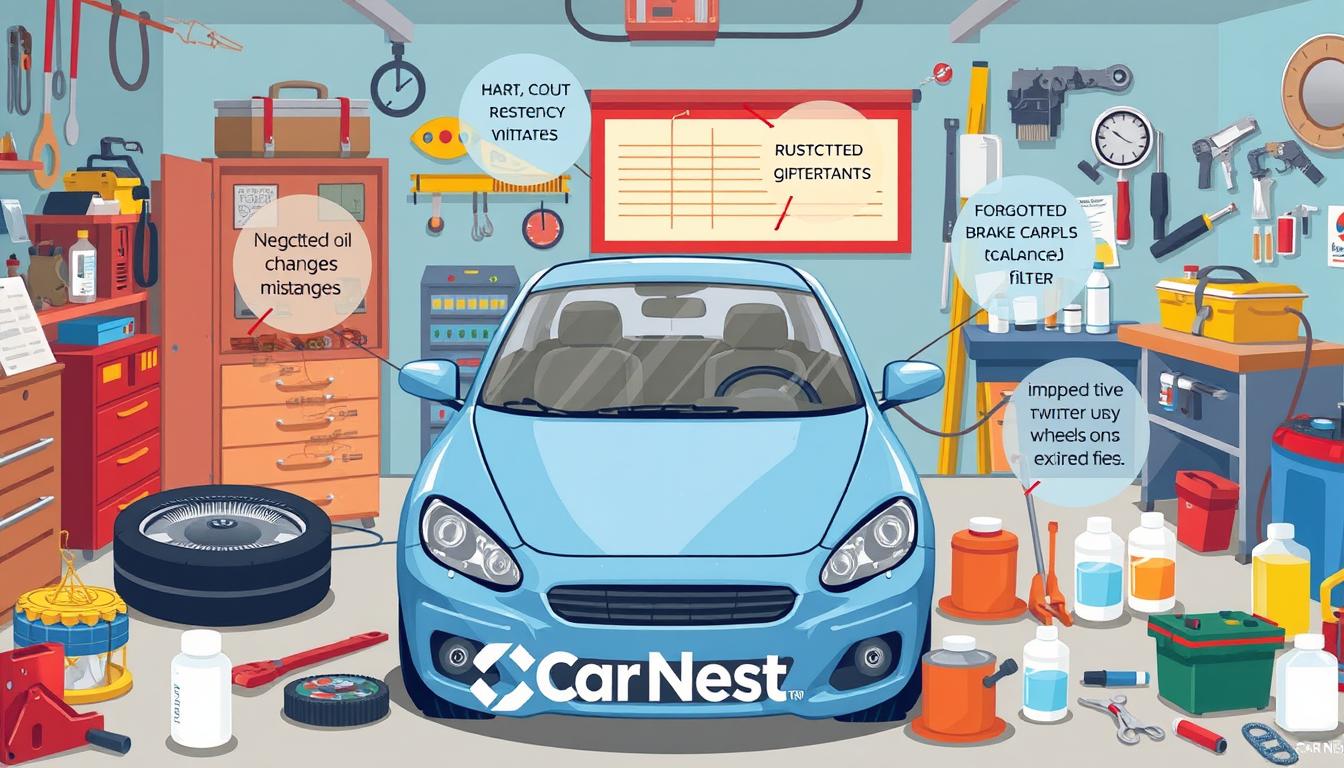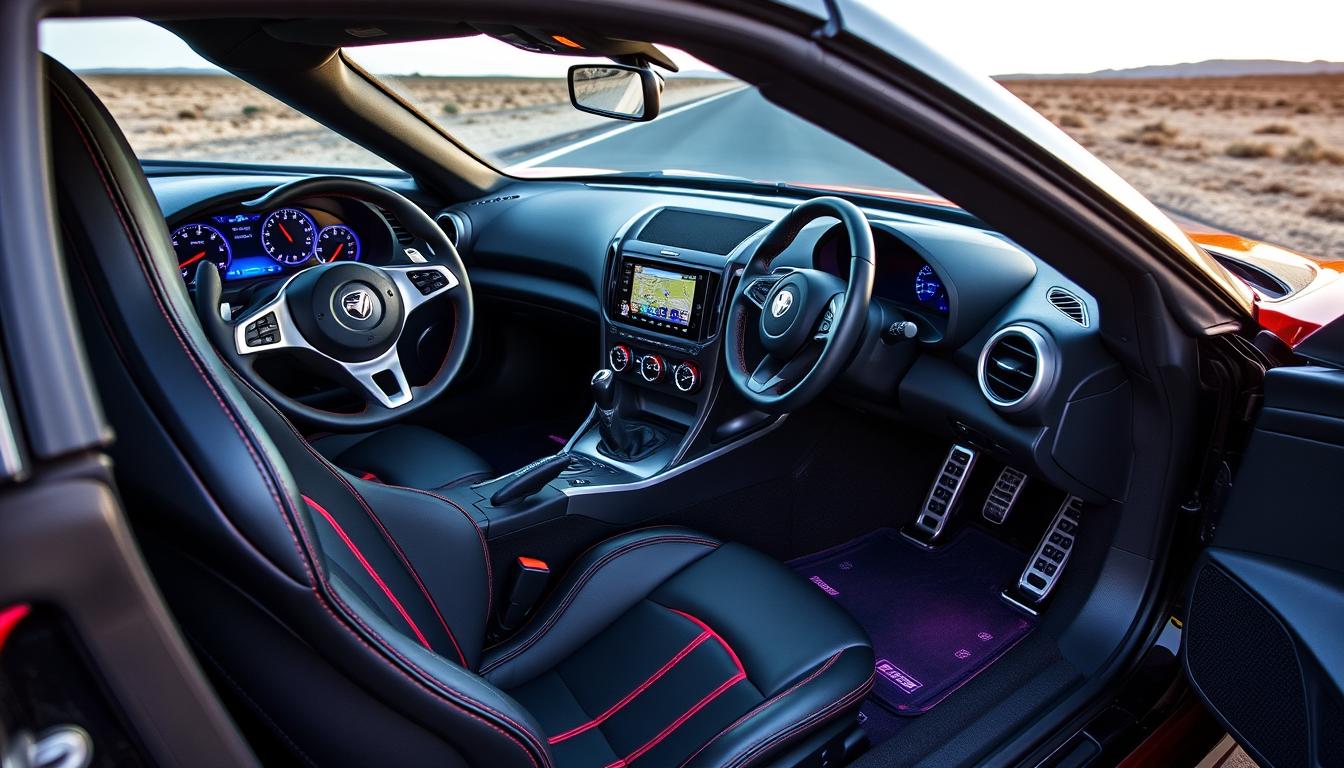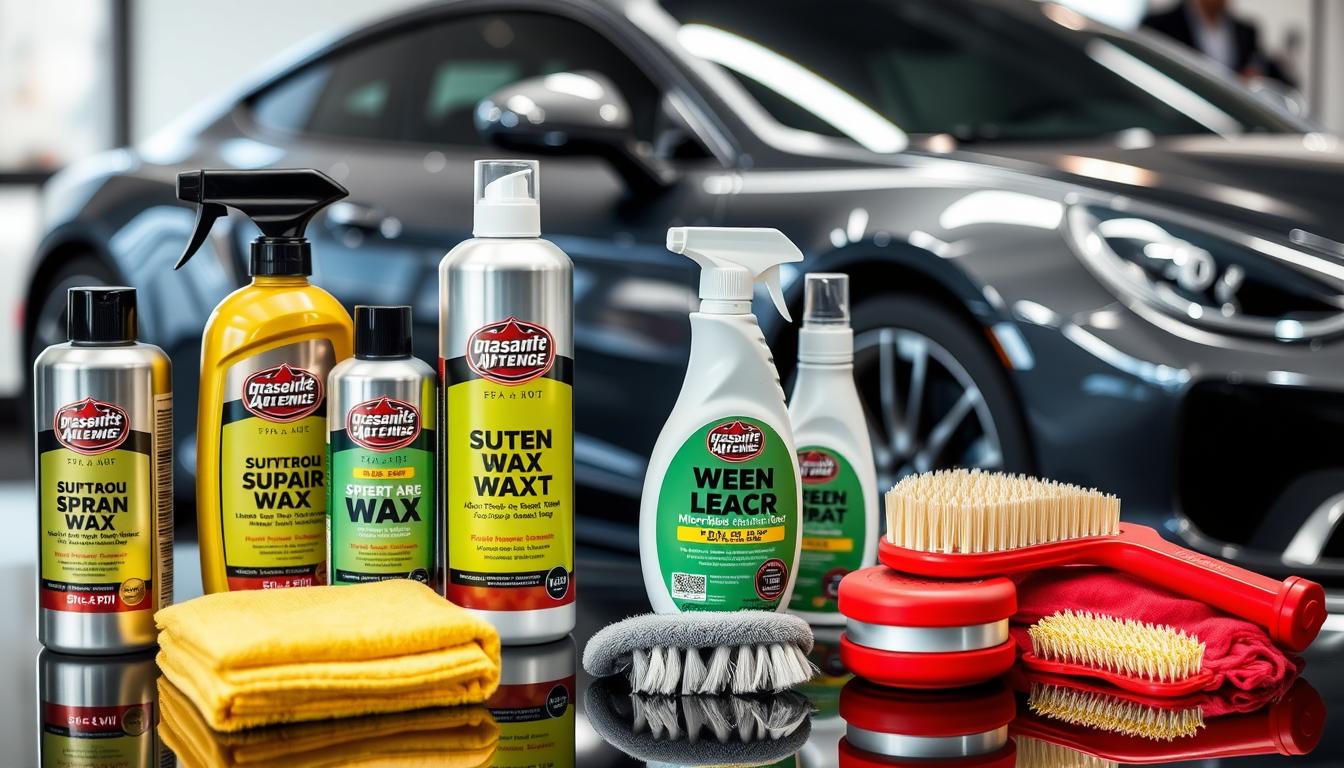Regular maintenance is key to keeping your car running well. Neglecting it can lead to expensive fixes and even accidents. Knowing the top 10 car maintenance mistakes to avoid is vital. This includes common errors and upkeep blunders.
By following a guide like the “Driver’s Guide 2025,” you can stay on top of your car’s needs. This ensures a smooth driving experience. For more on common car maintenance mistakes, check out car maintenance mistakes to avoid.
Key Takeaways
- Regular maintenance is key for your car’s life and saves money.
- Ignoring dashboard lights can turn small problems into big ones.
- Checking tire pressure monthly and rotating tires every 5,000-7,500 miles is important for fuel and safety.
- Using OEM parts ensures quality and prevents early failure.
- Checking fluid levels often prevents overheating, brake failure, and transmission issues.
- Following your car’s maintenance schedule prevents small problems from becoming big, expensive ones.
1. Neglecting Regular Oil Changes
Regular oil changes are key for your car’s engine. They keep it running smoothly and prevent damage. Skipping oil changes can cause engine problems and expensive fixes.
Not changing oil when needed can lead to engine sludge. This can cut engine efficiency by 40%. It’s important to follow the oil change schedule your car’s maker suggests.
Driving habits affect how often you need to change oil. Frequent stops and starts mean oil changes every 3,000 to 5,000 miles. Newer cars might need oil changes every 8,000-10,000 miles. Sticking to these schedules helps keep your engine in good shape.
- About 50% of car owners rarely or never change oil on time. This raises the risk of engine failure.
- Cars with regular oil changes last about 200,000 miles longer than those without.
Make regular oil changes a priority. It helps your car last longer and avoids common mistakes in car care.
2. Ignoring Tire Maintenance
Keeping your tires in good shape is key for your car’s safety and how well it runs. We often forget about tire care, which can cause big problems. Not taking care of your tires can lead to blowouts and accidents, making it a major mistake.
Checking your tires regularly is important to avoid these issues. Tire pressure is a big part of keeping tires healthy. Tires lose air when it gets colder, which can make your car use more gas and wear unevenly. Most car makers say to check and rotate tires every 5,000 miles to keep them lasting longer.
Importance of Tire Pressure
Checking tire pressure, including the spare, helps your car use less gas and wear tires evenly. If tires are not the right pressure, your car might use 3% more gas for every 1 PSI drop. Keeping the right pressure helps your car run better and stay safe.
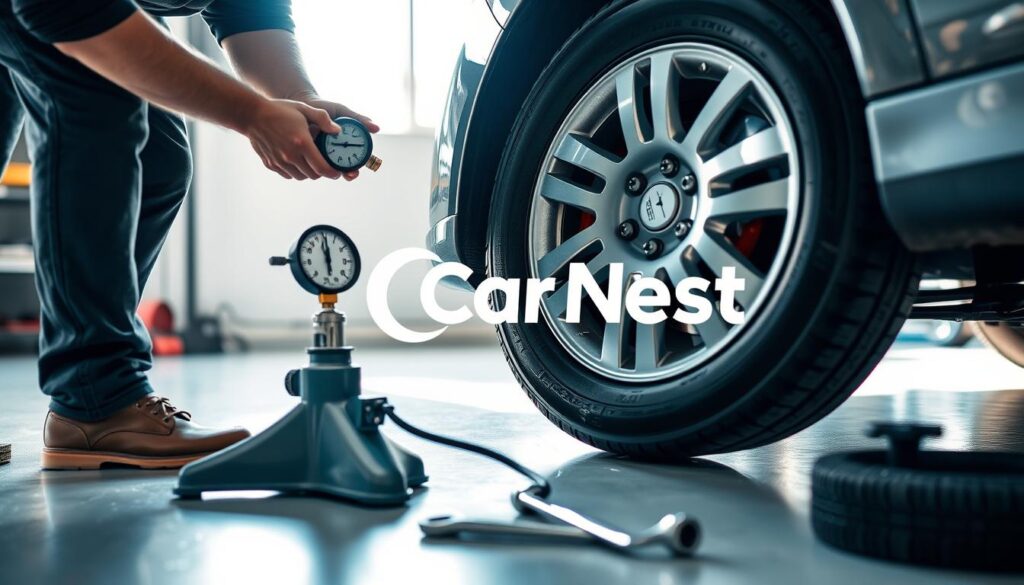
The Role of Tire Rotation
Rotating tires regularly can make them last 25% to 50% longer by wearing them evenly. This simple step helps prevent uneven wear and blowouts. It’s a key way to keep your car safe and running well.
3. Skipping Brake Inspections
Regular brake inspections are key for your car’s safety. They help spot worn brake pads and rotors. Skipping these checks can cause brake failure and accidents, making it a big car maintenance pitfall to avoid. The National Highway Traffic Safety Administration (NHTSA) says about 25% of cars have brake problems that can be dangerous.
Some common car upkeep blunders include not checking brakes regularly. Ignoring signs like squeaking or grinding noises is also a mistake. Not replacing brake pads and rotors on time can lead to expensive repairs and accidents. For reliable car maintenance tips, check out this car maintenance guide.
Regular brake checks can make your brakes last up to 30% longer and improve how well they work. It’s best to have them done every 6 months or 6,000 miles. Fixing brake problems quickly can save you up to 50% on repair costs over time.
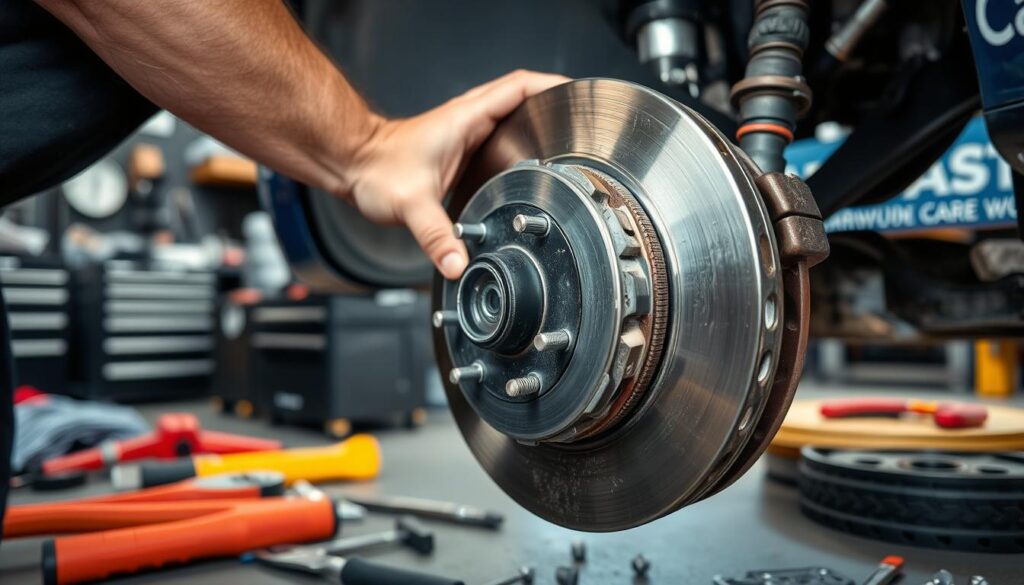
To avoid common car upkeep blunders, knowing the signs of worn brake pads and when to replace rotors is important. Here are some key facts to remember:
- 70% of drivers skip brake checks, which can lead to higher repair costs and safety risks.
- Annual brake inspections can cut emergency towing costs by 40% thanks to preventive care.
- The average cost to replace brake pads is between $100 and $300. Ignoring inspections can lead to repairs costing $1,000 or more.
| Brake Inspection Frequency | Recommended Interval |
|---|---|
| Regular Brake Checks | Every 6 months or 6,000 miles |
| Brake Pad Replacement | Every 30,000 to 50,000 miles |
| Rotor Replacement | Every 50,000 to 70,000 miles |
4. Overlooking Fluid Levels
Regular fluid checks are key for a car’s performance and safety. We often forget to check fluid levels, which can cause engine damage and expensive fixes. Studies show that ignoring fluid checks can lead to a 40% chance of engine overheating or transmission failure.
Not checking fluid levels is a big mistake in car maintenance. It can lead to serious problems. We should keep an eye on engine oil, coolant, brake fluid, and transmission fluid. Regular inspections can spot issues in up to 60% of vehicles before they break down.
Essential Fluids to Monitor
- Engine oil
- Coolant
- Brake fluid
- Transmission fluid
By avoiding mistakes like overlooking fluid levels, we can keep our cars running well. It’s important to know the risks of not checking fluids, like engine damage and expensive fixes. Regular fluid checks are key to keeping our cars in top shape.
How to Check Fluid Levels
Checking fluid levels is easy and can be done at home. We should look in our car’s manual for how to do it. This way, we can avoid mistakes and make sure our car gets the right care.
5. Failing to Replace Worn Wiper Blades
Replacing wiper blades regularly is key for your car’s safety and clear view. We often skip this simple task, leading to big mistakes. Not replacing worn wiper blades can cut visibility by up to 30% in the rain, raising the chance of accidents.
The National Highway Traffic Safety Administration (NHTSA) says up to 10% of road accidents are due to bad visibility from old wiper blades. This shows how important it is to check them often to avoid problems. Regular checks can cut accident chances by 50%.
Experts say to swap out wiper blades every 6 months to a year for best results. Replacing them costs between $15 to $30, which is much less than what accidents can cost. Good wiper blades can make a big difference, cutting streaks by up to 70%. Keeping wiper blades in good shape helps avoid accidents and keeps us safe.
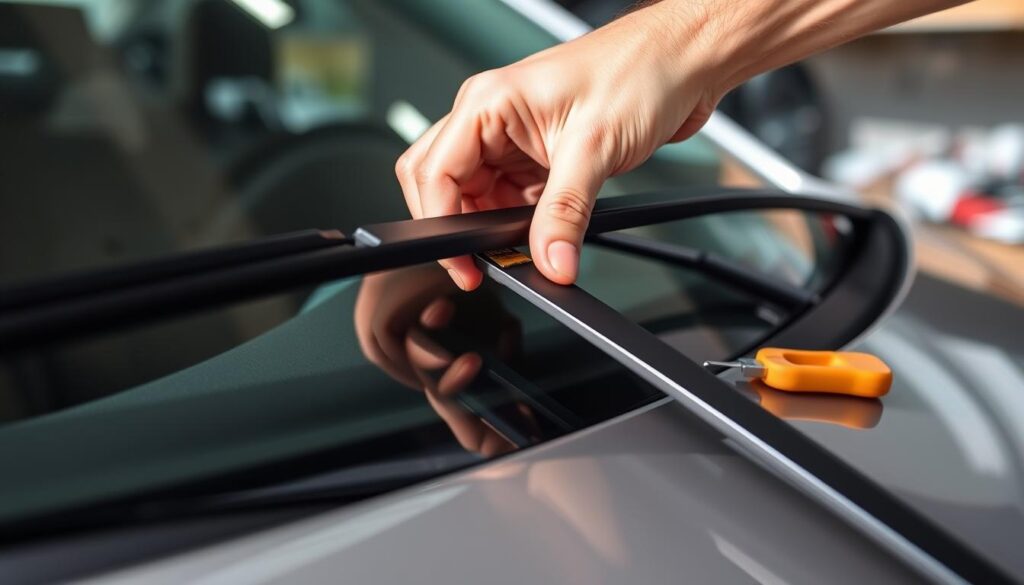
To avoid common car maintenance mistakes, make wiper blade replacement a regular part of your car care. This simple step can greatly lower accident risks and keep visibility clear, even when it’s bad outside. By staying ahead and replacing old wiper blades, we can dodge mistakes and keep everyone safe on the road.
| Replacement Interval | Cost | Benefits |
|---|---|---|
| Every 6 months to 1 year | $15 to $30 per pair | Improved visibility, reduced accident risk, enhanced performance |
6. Disregarding the Air Filter
Regular air filter replacement is key for your car’s performance and fuel use. Ignoring the air filter is a big mistake that can harm your car’s fuel efficiency and engine. It’s important to know how the air filter works and when to replace it.
Car reports say ignoring air filter changes can cut engine power by up to 10%. It also boosts harmful emissions by 15%. This is a big mistake for your car and the environment. To stay safe, check and maybe change the air filter every 12,000 to 15,000 miles.
Here are some air filter care tips:
- Regularly check the air filter for dirt and damage
- Change the air filter as the maker suggests
- Use a top-notch air filter for best results
By not making common mistakes like ignoring the air filter, you can avoid engine damage and save on fuel. This is a big part of keeping your car running well and lasting longer. It’s a key thing to avoid in car care.
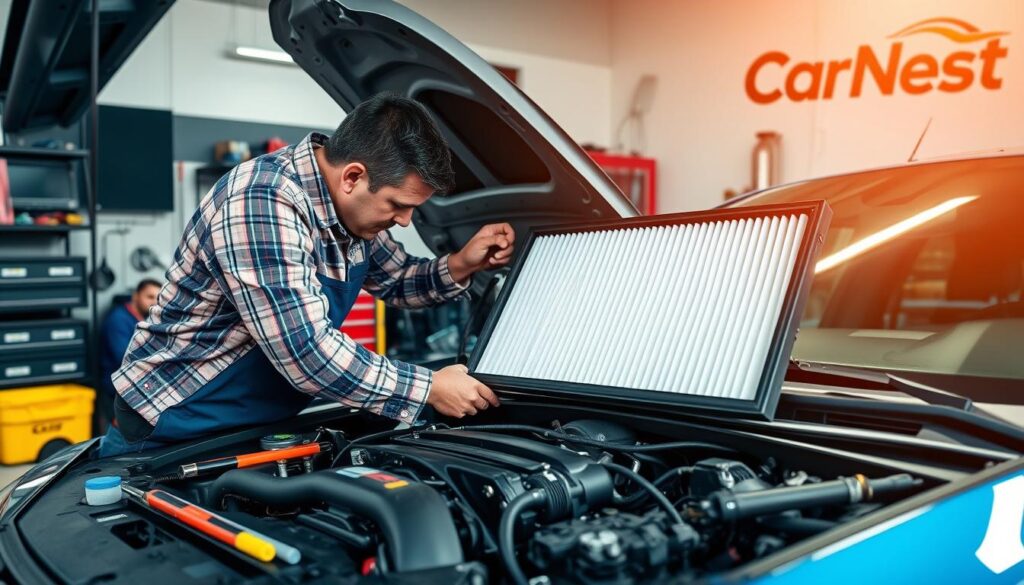
| Air Filter Maintenance | Recommended Interval | Consequences of Neglect |
|---|---|---|
| Inspection | Every 12,000 to 15,000 miles | Reduced engine performance, increased emissions |
| Replacement | According to manufacturer’s recommendations | Engine damage, decreased fuel efficiency |
7. Ignoring Dashboard Warning Lights
Checking dashboard warning lights is key for your car’s safety and performance. Ignoring these lights can cause serious mechanical issues. Studies show 60% of car problems come from ignored warning lights. It’s important to check these lights to avoid engine damage and expensive fixes.
Common Dashboard Lights Explained
Knowing what each dashboard light means is vital. For example, the Check Engine Light (CEL) can show many problems, from loose gas caps to serious engine issues. The Battery Light warns of a failing battery or alternator. The Brake System Warning Light signals brake system problems.
What to Do When a Light Turns On
If a dashboard warning light comes on, act fast. You might need to check the owner’s manual, talk to a mechanic, or get a vehicle check-up. This can cut down engine failure by 50% and save on repairs. Common mistakes include ignoring the CEL, skipping oil changes, and forgetting about tire care.
Ignoring dashboard warning lights is a major mistake among the top 10 car maintenance errors. Knowing about common car servicing mistakes and acting early keeps your car safe and running well. Regularly checking and fixing dashboard warning lights can prevent major mechanical issues and reduce breakdown risks.
8. Neglecting Battery Maintenance
Regular battery maintenance is key for your car’s performance and safety. We often forget this important step, leading to car problems. Not taking care of your battery can cause starting issues and even breakdowns.
The average car battery lasts three to five years. Not checking and cleaning battery terminals can shorten its life. This can lead to poor performance and early failure.
Some common mistakes include not checking battery age and condition. This can cause unexpected stops, which are dangerous. Neglecting battery checks can also be expensive. In fact, 90% of car owners skip this step, leading to costly replacements.
Regular battery testing can cut down on unexpected failures by up to 70%. This is a big safety plus.
Here are some tips to keep your battery going strong:
- Regularly check and clean corroded or loose battery terminals
- Monitor battery age and condition
- Perform annual battery testing
By following these tips, we can avoid car problems and keep our vehicles running well. Remember, regular battery checks can save you $100 to $200 on early replacements.
9. Using Incorrect Fuel Types
Many of us forget the importance of using the right fuel for our cars. This mistake can lead to car maintenance pitfalls to avoid. The wrong fuel can harm the engine, fuel system, and other parts, leading to expensive fixes. Using gasoline in a diesel engine can cause major damage, with repair costs reaching thousands of dollars.
Some common mistakes with fuel include misfuelling. This can cause engine problems, poor combustion, and a 30% drop in power and speed. Diesel engines can also get fouled spark plugs and a clogged catalytic converter from misfuelling. To avoid these issues, it’s key to use the right fuel for your car.
Here are some important points about fueling your vehicle:
- Using the correct fuel type can improve engine performance and fuel efficiency
- Misfuelling can lead to serious engine damage and costly repairs
- Regularly checking your vehicle’s fuel level and type can help prevent misfuelling incidents
By being careful with the fuel type and preventing misfuelling, you can make your car last longer and save on repairs. Remember, using the correct fuel is vital for your car’s performance and safety. It’s one of the easiest car maintenance pitfalls to avoid.
| Fuel Type | Vehicle Type | Potential Damage |
|---|---|---|
| Gasoline | Diesel Engine | Severe engine damage, costly repairs |
| Diesel | Gasoline Engine | Engine misfires, poor combustion, reduced power and acceleration |
10. Not Keeping a Maintenance Record
Keeping a detailed maintenance record is key for your vehicle’s health and longevity. It helps you stay on track with recommended maintenance. This way, you can spot issues early and keep your car’s value high.
Industry data shows vehicles with detailed maintenance logs can keep up to 20% more of their value. It’s important to create a simple log for oil changes, tire rotations, and more. This helps you stay on schedule and avoid big repairs later.
Regular maintenance not only extends your car’s life but also improves fuel efficiency and safety. It can save you thousands in repairs.
For more tips on car maintenance, check out this article.
